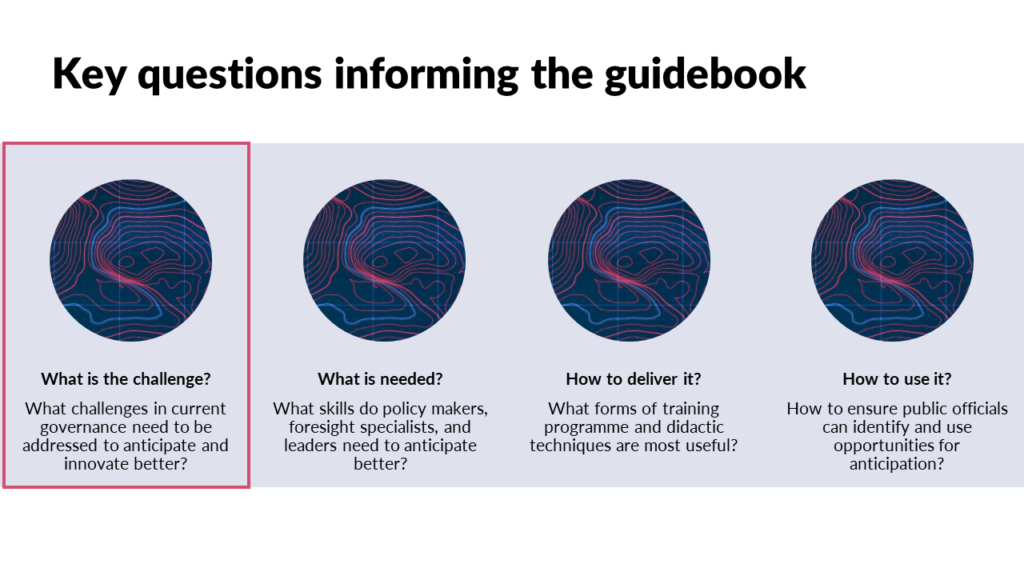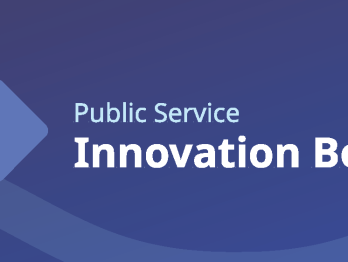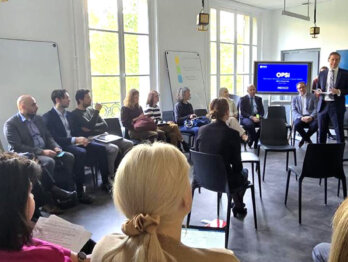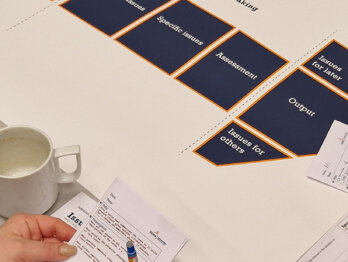Towards a Futures Guidebook: A customisable curriculum for anticipatory governance

The need for strategic foresight and anticipatory governance cannot be overstated. Governments worldwide are grappling with the challenge of preparing for future uncertainties while ensuring their policies and strategies are resilient and adaptive. The OECD Observatory of Public Sector Innovation (OPSI) is working to develop a curriculum and guidebook to bolster anticipatory governance capabilities based on our ongoing learnings from project LIMinal, with the governments of Lithuania, Italy, and Malta.
Our team extensively reviewed examples of strategic foresight and futures literacy training and capacity-building programmes. We identified what is available, what works, and what is still missing in equipping public officials with the tools, mindsets, and practical approaches to build anticipatory innovation into their governance, policy-making, and service delivery work. We found existing trainings to be overly generalised, heavily focused on technical foresight skills, and without adequate consideration for how trainings correspond to the real governance context of the stakeholders and target groups. To enhance our effort to build the next generation of capability-building guidance for the public sector, OPSI is collaborating with the School of International Futures (SOIF), well known for their capability-building work.
In this blog post, we explore the guidebook’s rationale, the challenges it aims to address, and the anticipated outcomes that underscore its importance in a rapidly changing and uncertain world.
From insights to actionable strategies
The impetus for this project stems from a noticeable gap in capacity-building programmes tailored to real-world anticipatory governance challenges. Current offerings are often overly abstract and theoretical or detached from the practical needs of public governance. This disconnect hinders the ability of public officials to embrace strategic foresight methods to effectively navigate and implement forward-looking policies and strategies. At the same time, heightened global interest among national public officials and institutions in developing “future proof” public policies has created a window of opportunity for strategic foresight and anticipatory innovation. The OECD’s technical experience with real-world governance challenges, including through the comprehensive assessments and challenge identification conducted as part of the LIMinal project, presents a timely opportunity to provide governments with a guidebook composed of good practice guidance and content for designing and implementing tailored anticipatory governance curricula and capability-building programmes. These insights are supplemented by our prior anticipatory innovation governance work in Finland, Ireland, Slovenia, and elsewhere.

Objectives and Outcomes
The key outputs of the project are a curriculum map, governance challenge-oriented Capability-Building Programmes (CBPs), and an Anticipatory Governance Guidebook for selecting and adapting the curriculum to individual situations. Our approach targets three essential groups for a functioning anticipatory governance system – foresight producers, policymakers (foresight users), and senior leaders – with tailored and action-oriented learning experiences that address specific needs and competencies. We are currently engaged in:
- The development of a curriculum that supports governments in enhancing their strategic foresight and anticipatory governance capabilities.
- The production of a guidebook oriented around four key challenge areas, offering a structured set of courses, modules, and learning outcomes.
- The refinement of the curriculum map to facilitate easy navigation and highlight relevant skills and competencies based on role.
By insisting on a tailored approach to capability building, we not only aim to build individual agency and skills in “doing” foresight, but also the authorising environment in which to use it effectively to shape policy decisions and actions. See our foundational paper that describes the elements of an anticipatory innovation governance system.
Designing adaptable learning experiences
The project confronts several challenges head-on. Firstly, it seeks to bridge the gap between theoretical knowledge and real-world application of strategic foresight and anticipatory innovation, ensuring that the curriculum is grounded in practical needs and real governance situations. Secondly, it aims to cater to diverse learning needs across different target groups, requiring a flexible and adaptable curriculum design. Thirdly, the project acknowledges the need for a comprehensive ecosystem approach that respects each country’s context, necessitating tailored interventions that are both action-oriented and sustainable.

To support these ends, the team is developing a process for tailoring that begins from a diagnostic phase to ensure the curriculum meets the end users’ needs and maximises resources, followed by the application of the guidebook to design context-specific capacity-building programmes.
Anticipated impact
We are learning from the best – both in terms of others who have developed curricula and programmes as well as best practices currently used in governments around the world. By fostering a proactive and anticipatory approach to governance, we aim not only to equip public officials with the necessary skills and knowledge but also to inspire a broader cultural shift towards future-oriented policymaking in the wider OECD community and beyond. At this stage, we are looking for early adopters and testers of our work and encourage you to get in touch with us via [email protected] if you are interested in providing your input and review.
In subsequent blog posts, we will delve deeper into the structure and outline of the curricula and capability-building programmes. We will discuss how we tested it in Lithuania, Italy, and Malta, and share the final resources for your further use and adaptation. If you have government focused foresight curricula, we invite you to share them with us to further inform the development of our customisable curriculum for anticipatory governance.
This project is funded by the European Union via the Technical Support Instrument, and implemented by the OECD, in cooperation with the European Commission.











